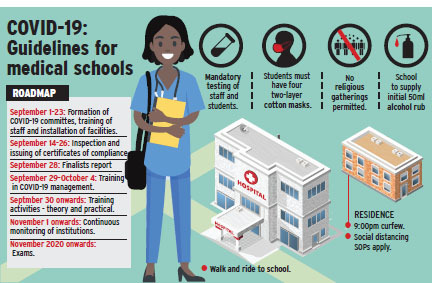Medical students resume school in three weeks
Final year students at health-related institutions and universities will report to their respective academic institutions on September 28, 2020.
The National Council for Higher Education (NCHE) has set tight guidelines for final year health students and staff.
Final year students at health-related institutions and universities will report to their respective academic institutions on September 28, 2020.
On the same day, the guidelines say, all students will be required to attend a mandatory coronavirus (COVID-19) training in infection prevention and Standard Operating Procedures (SOPs).
There will also be mandatory testing of both staff and students and disinfection of institutions which are currently used as isolation centres.
According to the guidelines, which New Vision has obtained, students will have restricted movement during the time at the institution, to prevent the spread of the pandemic.
The guidelines were issued on Tuesday by Prof Mary Okwakol, the executive director of NCHE.
Mary Okwakol said the Government has addressed itself to the fact that medical health interns provide significant service at health facilities.
"It has been noted that the current interns will complete their programme soon, and a new team would ordinarily be expected to take over from them," she said.
In her notice to vice-chancellors and principals of institutions offering health-related training, Okwakol warned that if the internship schedule is not followed, there will be a gap, which could hurt the health sector.

In addition, she said, President Yoweri Museveni has approved the re-opening of institutions with final year students undertaking health-related training.
The reopening of institutions to finalists, she said, will enable students complete their duties, so as to fill the human resource gap that the health sector would face.
In line with the President's directive, the guidelines have banned congregational gatherings for fellowships, chapel or mosque prayers at the respective academic institutions.
The students will also be required to report with at least four reusable two-layer cotton masks and, "a 50 ml alcohol rub will be initially supplied by the institutions. Each student will be required to refill their bottles when finished," the guidelines read.
MORE REQUIREMENTS
Clinical students will be required to have two clinical coats, uniforms, aprons and scrubs, respectively, and those will be left in designated rooms.
"No student will be allowed to take used clinical coats, uniforms, aprons and scrubs in their halls of residence or hostels."
Institutions are required to provide central washing points for used clinical coats, aprons and scrubs.All clinical students are expected to participate in ward rounds, clerkships and other clinical activities as determined by the clinical department.
According to NCHE, once the guidelines have been met, institutions will be granted certificate of compliance by the education ministry.
CATEGORIES OF FINALISTS
The guidelines are addressed to a section of health finalists undertaking: Bachelors in Medicine and Bachelors of Surgery, nursing, midwifery, dental surgery and pharmacy.
The list includes finalists from Allied Medical Professionals, such as medical laboratory technology, orthopaedic, public health, clinical officers, physiotherapists and radiography technicians.
The priority finalists also include post-graduate students on health-related programmes, other post-graduate students, such as doctors, nurses and midwives, who are qualified and are already in practice. It also includes finalists undertaking training at diploma level in different health disciplines.
INSTITUTIONS USED FOR QUARANTINE
All institutions used as quarantine facilities for COVID-19 cases should be evacuated and disinfected.
These include Arua School of Comprehensive Nursing, Fort Portal College of Health Services, Gulu College of Health Sciences, both Jinja and Hoima schools of nursing and midwifery. Schools of comprehensive nursing in Lira, Kabale, Masaka and Soroti, and schools of nursing in Kaabong and Ngora.
Prof Paul Waako, the vice-chancellor of Busitema University, said: "It is good that the Government has allowed the health finalists to report. We train them to handle pandemics, and COVID-19 will be the best test for anyone," he said.